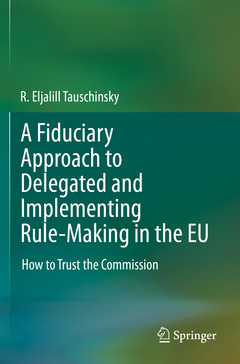Description
A Fiduciary Approach to Delegated and Implementing Rule-Making in the EU, 1st ed. 2020
How to Trust the Commission
Language: English
Subjects for A Fiduciary Approach to Delegated and Implementing...:
Keywords
Fiduciary law theory; Delegated and implementing acts; Commission rule-making powers; Institutional trust; Administrative rule-making; Trust in EU institutions; Foundation of EU public powers; Democracy; EU legal acts; Art; 290 TFEU; European Parliament; EU Commission; Treaty of Lisbon; EU legal structures; Democratic deficit; european union politics
Publication date: 11-2020
221 p. · 15.5x23.5 cm · Paperback
Publication date: 11-2019
221 p. · 15.5x23.5 cm · Hardback
Description
/li>Contents
/li>Biography
/li>Comment
/li>
This book focuses on the evaluation of delegated and implementing rule-making, based on Articles 290 and 291 TFEU. These articles have attracted considerable attention since their introduction in 2009, and their implementation is one of the most hotly debated questions in European Administrative Law. The book takes up this timely topic, discusses it in an innovative way and offers valuable new insights.
Delegated and implementing acts are the most common form of EU legal acts. However, despite their ubiquity and relevance, it is unclear how the Commission?s powers to adopt these important acts relates to subjects? democratic rights. Accordingly, the book explores the question of how the Commission?s powers to adopt delegated and implementing acts can be justified. The relationship between the Commission and the persons within the Member States who are directly affected by its rule-making should be seen, the book argues, as one of institutional trust, and as a result asa fiduciary relationship.
The book begins by defining the theoretical conditions for a justificatory approach, before explaining the background and foundations of fiduciary law. It then links this theoretical perspective with the realities of delegated and implementing acts, describing how the various roles in fiduciary relationships map onto the rule-making process that produces delegated and implementing acts, and explains how the fundamental tenet of fiduciary relationships ? loyalty ? can be included in the rule-making process.
These books may interest you

Fiduciary Government 148.73 €



